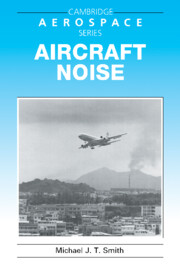Book contents
- Frontmatter
- Contents
- Preface
- Acknowledgments
- 1 Human reaction to aircraft noise
- 2 Action against aircraft noise
- 3 Aircraft noise sources
- 4 Power-plant noise control
- 5 Concorde – a special case
- 6 Noise data acquisition and presentation
- 7 Aircraft noise prediction
- 8 Prospects for the future
- 9 Review
- Appendices
- References
- Index
8 - Prospects for the future
Published online by Cambridge University Press: 06 November 2009
- Frontmatter
- Contents
- Preface
- Acknowledgments
- 1 Human reaction to aircraft noise
- 2 Action against aircraft noise
- 3 Aircraft noise sources
- 4 Power-plant noise control
- 5 Concorde – a special case
- 6 Noise data acquisition and presentation
- 7 Aircraft noise prediction
- 8 Prospects for the future
- 9 Review
- Appendices
- References
- Index
Summary
Over the years, much has been said about the future. Usually, environmentalists predict that worse is to come, the industry expects a rosy future, whilst governments try to present a “balanced” view.
The future always depends on the starting point; and no two observers, or victims of aircraft noise, have the same viewpoint. Some live near well-developed and possibly operationally saturated airports and therefore experience the benefits of advancing technology in the form of lower individual aircraft noise levels and a generally improving environment; others are adjacent to new or expanding fields, where the growth in the number of operations is the overriding factor; a small percentage of people would complain in any case – if aircraft were silent there would be some who would perceive a “stealth” factor.
The importance of aircraft noise in society in the future will be a function of several factors. Uppermost are whether the manufacturing industry will be successful in advancing noise control technology, whether air transportation is going to expand to any significant degree and how sensibly government and airport operators apply controls. All these factors bear examination in trying to build a picture of the future, as does the question of whether the available noise-forecasting tools are right for the job. This is most important; the weighting applied to individual elements of forecasting methods must be examined, since they can have a tremendous influence on predicted trends in noise “exposure” and, hence, any decisions based on those predictions.
- Type
- Chapter
- Information
- Aircraft Noise , pp. 246 - 280Publisher: Cambridge University PressPrint publication year: 1989



